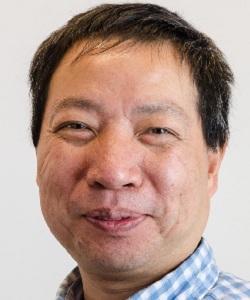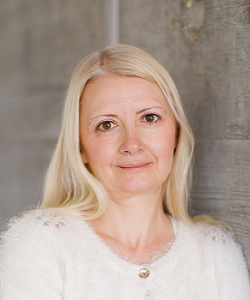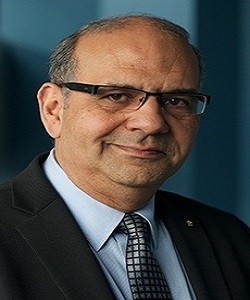
Keynote Speakers

Prof. Chunming Rong
Professor, University of Stavanger, NORWAY Chair,
IEEE Computer Society Blockchain
Co-Founder, bitYoga.com and Dataunitor.com
Title :
Secure Blockchain Ecosystem – The Network is my Computer
Abstract :
Blockchain and other distributed ledger technologies (DLTs), through recent development, have not only enabled simple transactions, but also complex computation on a network where parties are geographically distant or have no particular trust in each other to interact and exchange value and information on a fully distributed basis with fewer to non-existent central intermediaries. There are obvious advantages associated with blockchain in areas such as, decentralization, disintermediation, replication, timestamping, immutability, digital signatures, automation and smart contracts, transparency and censorship resistance, especially in relation with the financial sector. However, there are also noticeable challenges, for instances, scalability and performance, energy consumption, security and privacy. Many popular applications are cloud related. These advances are now not just limited to the financial sector, but also new internet applications can harness these building blocks to empower users to take control of their online footprint, such as in healthcare, social media and other digital services. We are building an open source hub for a secure and source-controlled blockchain ecosystem, as the gathering place for academic researchers, practitioners and business innovators alike, where they may meet and work together online to embrace, promote and enhance blockchain technologies and their applications. This will bring us to new platform, new business model and new ecosystem.
Short Bio :
Prof. Chunming Rong is the chair of IEEE CS STC on Blockchain, and served as co-chair of IEEE Blockchain in 2018. He is also chair of IEEE Cloud Computing. He works as the head of the Center for IP-based Service Innovation (CIPSI) at the University of Stavanger (UiS) and also as adjunct Senior Scientist leading Big-Data Initiative at NORCE. He is also co-founder and CTO of two start-ups bitYoga and Dataunitor in Norway, both received EU Seal of Excellence Award in 2018. He was the vice president of CSA Norway Chapter (2016-2017). His research work focuses on data science, cloud computing, security and privacy. He is an IEEE senior member and is honoured as member of the Norwegian Academy of Technological Sciences (NTVA) since 2011. He has extensive contact network and projects in both the industry and academic. He is also founder and Steering Chair of IEEE CloudCom conference and workshop series. He is the steering chair and associate editor of the IEEE Transactions on Cloud Computing (TCC), and co-Editors-in-Chief of the Journal of Cloud Computing (ISSN: 2192-113X) by Springer. Prof. Rong has extensive experience in managing large-scale R&D projects funded by both industry and funding agencies, both in Norway and EU. .

Prof. Maria Fasli
Institute for Analytics and Data Science at the University of ESSEX
Title :
Data Science and AI: Trends, Myths and Challenges
Abstract :
The availability of cheap computational devices and the growth of the WWW and applications has led to the proliferation in the amount of data - both structured and unstructured. In turn, increased computational power, cheap storage and data proliferation have led to the development of new techniques in Data Science and unprecedented progress in Artificial Intelligence (AI). From powering recommendation engines to autonomous vehicles, AI has seen a reinvigoration in interest while industry and academia have been investing heavily to remain competitive and take advantage of the power of AI. But is AI a panacea and how much progress has really been made in the field? This talk will explore the trends, myths but also challenges that AI poses providing a critical perspective of the field and where the pitfalls may lie.
Short Bio :
Prof. Maria Fasli is a Professor, Director of the ESRC Business and Local Government Data Research Centre and Director of the Institute for Analytics and Data Science at the University of Essex. Educated in Greece (BSc Informatics 1996) and the UK (PhD Computer Science 2000), she has held positions at Essex since 1999. In 2005, she was awarded a National Teaching Fellowship by the HEA UK for her innovations in education. Between 2009-2014, she was Head of School of Computer Science and Electronic Engineering. In 2016, she was awarded a UNESCO Chair in Analytics and Data Science. Her research interests lie in artificial intelligence techniques for complex systems and analysing and modelling structured/unstructured data. Her research has been funded by Research Councils and other organisations and she has worked with a range of companies in data analytics related projects. She has published over 130 papers in the field of AI and data science and has delivered keynote talks at conferences

Prof. Tarek El Ghazawi
IEEE Fellow and Professor
George Washington University
Title :
The Convergence of Big Data, HPC, Cloud, AI, and IoT
Abstract :
The top supercomputer, Summit, can perform 148,600 trillion calculations in one second (148.6 PF on LINPAC). The top two supercomputers are now in the USA followed by two Chinese supercomputers. Many countries are racing to break the record and build an ExaFLOP supercomputer that can perform more than one million trillion (quintillion) calculations per second, planned for 2021. Incidentally, data volumes due social media, big observatories and the internet of things (IoTs) have been exploding. AI on the other hand has been a successful technique with advances in deep learning to leverage those large volumes of data. The cloud simply transcends all that and provides a much needed environment for integration. Those concurrent developments have thus resulted in what is seen as the Convergence of Big Data, HPC, AI and IoT unleashing a tremendous potential for a new era and opportunities. In this talk we examine this convergence and how these areas are no integrating and impacting one another.
Short Bio :
Prof. Tarek El Ghazawi is a Professor in the Department of Electrical and Computer Engineering at The George Washington University, where he leads the university-wide Strategic Academic Program in High- Performance Computing. He is the founding director of The GW Institute for Massively Parallel Applications and Computing Technologies (IMPACT) and was a founding Co-Director of the NSF Industry/University Center for High-Performance Reconfigurable Computing (CHREC). El-Ghazawi’s interests include high-performance computing, computer architectures, reconfigurable and embedded computing, nanophontonic based computing. He is one of the principal co-authors of the UPC parallel programming language. At present he is leading and co-leading efforts for Post-Moore’s Law processors including analog, nanophotonic and neuromorphic computing. Professor El-Ghazawi is a Fellow of the IEEE and selected as a Research Faculty Fellow of the IBM Center for Advanced Studies and a UK Royal Academy of Engineering Distinguished Visiting Fellow and a Distinguished Visiting Speaker for the IEEE Computer Society. He was awarded the Alexander von Humboldt Research Award, from the Humboldt Foundation in Germany, the Alexander Schwarzkopf Prize for Technical Innovation, The IEEE Outstanding Leadership Award by the IEEE Technical Committee on Scalable Computing, and the GW SEAS Distinguished Researcher Award. El-Ghazawi has served as a senior U.S. Fulbright Scholar.

Prof. Panda Dhabaleswar
The Ohio State University
Title :
HPC and AI Meet Cloud: Opportunities and Challenges in Designing High-Performance MPI and Deep Learning Libraries for Public Cloud
Abstract :
Significant growth has been witnessed during the last decade in dedicated HPC clusters with multi-/many-core processors, accelerators, and high-performance interconnects (such as InfiniBand, Omni-Path, iWARP, RoCE and EFA). Public cloud providers like Amazon-AWS and Microsoft-Azure are gradually aiming to provide solutions for High-Performance Computing (HPC) and Deep Learning (DL) users and applications. Microsoft-Azure has recently moved to bare-metal environment with InfiniBand networking technology. Amazon-AWS has moved to using a new network adapter, Elastic Fabric Adapter (EFA), for its HPC instances. These new networks and platforms provide a new set of opportunities and challenges to design high-performance MPI and DL libraries for these emerging public cloud platforms. The MVAPICH MPI library (http://mvapich.cse.ohio-state.edu) has been a significant middleware component in the HPC domain for the last 18 years. Recently, the MVAPICH library is also enabling high-performance and scalable DL applications. The MVAPICH team members are currently working closely with Amazon-AWS and Microsoft-Azure to design and deploy high-performance and scalable MPI library for their respective could infrastructures. This talk will provide details on these designs, their performance (micro-benchmarks and applications) and comparison with other MPI libraries. A set of results comparing the performance numbers of HPC and AI applications on cloud environments with dedicated (non-virtualized) clusters will be presented
Short Bio :
Prof. Panda Dhabaleswar is a Professor and University Distinguished Scholar of Computer Science and Engineering at the Ohio State University. He has published over 450 papers in the area of high-end computing and networking. The MVAPICH2 (High Performance MPI and PGAS over InfiniBand, Omni-Path, iWARP and RoCE) libraries, designed and developed by his research group (http://mvapich.cse.ohio-state.edu), are currently being used by more than 3,025 organizations worldwide (in 89 countries). More than 589,000 downloads of this software have taken place from the project's site. This software is empowering several InfiniBand clusters (including the 3rd, 5th, 8th, 15th, 16th, 19th, and 31st ranked ones) in the TOP500 list. The RDMA packages for Apache Spark, Apache Hadoop and Memcached together with OSU HiBD benchmarks from his group (http://hibd.cse.ohio-state.edu) are also publicly available. These libraries are currently being used by more than 315 organizations in 35 countries. More than 31,100 downloads of these libraries have taken place. High-performance and scalable versions of the Caffe and TensorFlow framework are available from https://hidl.cse.ohio-state.edu. Prof. Panda is an IEEE Fellow. More details about Prof. Panda are available at http://www.cse.ohio-state.edu/~panda.

Prof. Helen Karatza
Department of Informatics Aristotle University of Thessaloniki, Greece
Title :
Cloud and Fog Computing Resource Allocation and Scheduling of Complex Real-Time Applications
Abstract :
Cloud computing provides a virtually unlimited pool of resources to the end-users.Due to the popularity of the cloud computing paradigm,
new complex computationally intensive applications have emerged. However, many important issues such as resource allocation,
job scheduling, cost, and quality of service must be addressed in order to exploit cloud’s full potential.
Complex application scheduling in the cloud is a challenging problem. Furthermore, it is more difficult to schedule complex real-time
applications, considering deadlines along with energy conservation. Therefore, energy efficient scheduling strategies are
required ensuring timeliness.
Due to the increasing number of Internet of Things (IoT) applications, fog computing has emerged as a new paradigm, beyond cloud computing.
The fog extends the cloud to the network edge in order to reduce data transmission latency. Real-time applications should be appropriately
assigned to resources in both the fog and cloud layers, taking into account the communication and computational
characteristics of each application.
In this keynote talk we will focus towards challenges on resource allocation and scheduling complex real-time applications in
cloud and fog systems and we will provide future research directions in this emerging research area.
.
Short Bio :
Prof. Helen Karatza is a Professor Emeritus in the Department of Informatics at the Aristotle University of Thessaloniki, Greece, where she teaches courses in the postgraduate and undergraduate level. Dr. Karatza's research interests include Fog and Cloud Computing, Energy Efficiency in Large Scale Distributed Systems, Resource Allocation and Scheduling and Real-time Distributed Systems. Dr. Karatza has authored or co-authored 225 technical papers and book chapters including five papers that earned best paper awards at international conferences. She is senior member of IEEE, ACM and SCS, and she served as an elected member of the Board of Directors at Large of the Society for Modeling and Simulation International. She served as Chair and Keynote Speaker in International Conferences. Dr. Karatza is the Editor-in-Chief of the Elsevier Journal “Simulation Modeling Practice and Theory” and Senior Associate Editor of the “Journal of Systems and Software” of Elsevier. She was Editor-in-Chief of “Simulation Transactions of The Society for Modeling and Simulation International” and Associate Editor of “ACM Transactions on Modeling and Computer Simulation”. She served as Guest Editor of Special Issues in International Journals. More info about her activities/publications can be found in http://agent.csd.auth.gr/~karatza/

Prof. Qiang Tang
Luxembourg Institute of Science and Technology
Title :
DLT-enabled trustworthy distributed machine learning
Abstract :
In this talk, I will give a brief introduction to distributed ledger technologies (i.e. DLTs), and then show how it can serve as an enabler for trustworthy distributed machine learning. The core trustworthiness properties include privacy for the individual datasets and the robustness of trained machine learning models. In addition, properties such as accountability and fairness can also be achieved with the help of DLT .
Short Bio :
Prof. Qiang Tang is a senior researcher from the TSS (Trusted Service Systems) unit of the ITIS (IT for Innovative Services) department at Luxembourg Institute of Science and Technology (LIST, Luxembourg). He is an adjunct professor at the East China Normal University, Shanghai, China. His research interests lie in applied cryptography, privacy enhancing technologies, DLT-enabled security design, and the security and privacy issues in machine learning and data mining (particularly recommender systems). Dr. Tang holds a Master (Peking University, China) and a Ph.D. in Information Security and Cryptography (Royal Holloway, University of London, UK). Before joining LIST in 2016, he worked as Postdoc Researcher and Principal Investigator at the University of Luxembourg. As Postdoc Researcher, he also worked at the University of Twente/Netherlands (2007-2012) and at Ecole Normale Supérieure, Paris, France (2006-2007). Qiang is affiliated with ILNAS (Institut Luxembourgeois de la Normalisation, de l'Accréditation, de la Sécurité et qualité des produits et services) by serving in the subcommittee ISO/IEC JTC 1/SC 27 (security) and SC42 (Artificial Intelligence), and TC 307 (Blockchain).

Prof. Othmane Bouhali
TEXAS A&M UNIVERSITY AT QATAR
Title :
Artificial intelligence and modeling activities in imaging and medical physics accplication
Abstract :
Artificial intelligence (AI) has captured the attention of the scientific and business communities for decades. With its associated technologies, such as machine learning (ML) and deep Learning (DL), AI has provided very efficient tools and platforms that help reducing cost, improving efficiency, and increasing competitiveness. In this talk I will give an overview of our recent work on applying AI techniques in several fields of health sectors including imaging and medical physics applications. Our I will also review our activities in modeling medical and imaging devices.
Short Bio :
Prof. Othmane Bouhali is research professor and director of Research Computing at Texas A&M University at Qatar. He his the founder and director of the TAMUQ Advanced Scientific Computing group (TASC), a specialized group in computational modeling and simulation. His main work is on computational physics, Monte Carlo simulation and high performance computing. Before he joined TAMUQ, he was given the responsibility of the computing group at the High Energy Physics Institute of Brussels. His research focused on the scientific grid computing, in particular the optimization and implementation of the grid infrastructure for intensive scientific applications. Currently he is involved in several projects on medical physics, 3D scientific visualization, distributed computing and image analysis techniques.

Prof. Abdelmounaam Rezgui
Illinois State University
Title :
Better Edges Not Bigger Graphs: Friending Algorithms for the Next-Generation Social Networks
Abstract :
Online social networks use friendship recommendation (or friending) algorithms to grow their graphs. These algorithms are used to suggest new connections to existing users. Current friending algorithms are designed to generate new friendship recommendations that are likely to be accepted. However, these algorithms often generate recommendations for weak connections that do get accepted but lead to little or no interaction between users. For example, Facebook’s Friends-of-Friends (FoF) algorithm has a high acceptance rate but the strength of the connections, measured by interactions, is reportedly low. In this talk, we first show the significance of the concept of “level of interaction” on social networks. We then discuss the limitations of existing friending algorithms and highlight the side effects of generating easily accepted but weak connections between people. We also explain the need for new metrics and friending algorithms to grow the next generation of social networks in a meaningful way, i.e., in a way that actually leads to higher levels of social interactions instead of merely growing the number of edges. To overcome the limitations of current friending algorithms, we present a clustering-based interaction-driven friendship recommender algorithm and show through extensive experiments that it does generate friendship recommendations that have a higher probability of leading to interactions between users than existing friending algorithms. .
Short Bio :
Prof. Abdelmounaam Rezgui is a faculty member in the School of Information Technology at Illinois State University. He received his PhD in Computer Science from Virginia Tech. His research interests include: networking, cloud computing, social networks, and big data. Abdelmounaam authored or coauthored over 90 papers in top journals and conferences including IEEE TBD, IEEE TKDE, ACM TOIT, IEEE TPDS, IEEE Internet Computing, IEEE Security and Privacy, IEEE ICDE, IEEE IC2E, and IEEE CLOUD. His research has been funded by NASA and Microsoft. He regularly serves on the program committees of several major conferences including IEEE Big Data, IEEE BigDataSE, IEEE Globecom, IEEE CloudNet, IEEE LCN, and IoTBDS. He has been a track chair, keynote speaker, or tutorial presenter at several international conferences. He also is on the editorial board of several journals including Springer’s Big Data Analytics. Research conducted by Abdelmounaam and his students has been invited for presentation at very selective events organized by major organizations including Google, NSF, and Siemens.

Prof. Mouhammed Boulmalef
UIR, Rabat, Morocco
Title :
TBA
Abstract :
TBA .
Short Bio:
Prof. Mouhammed Boulmalef
TBA